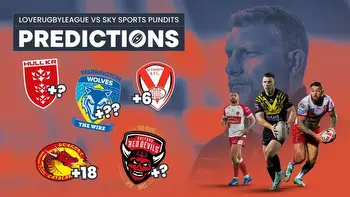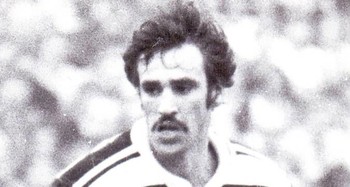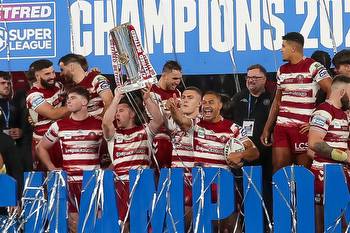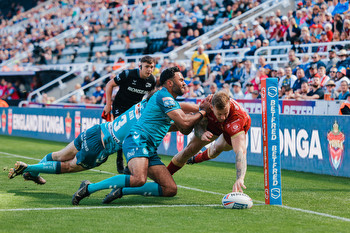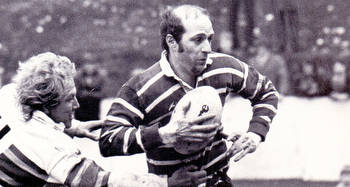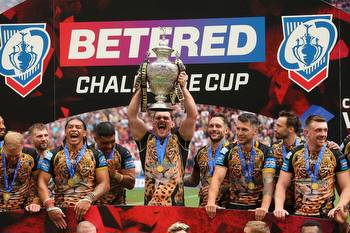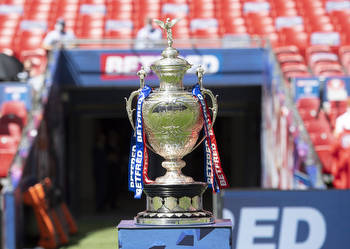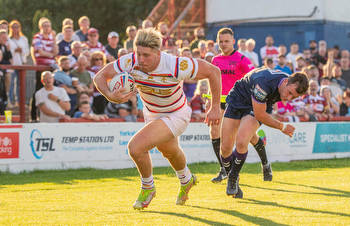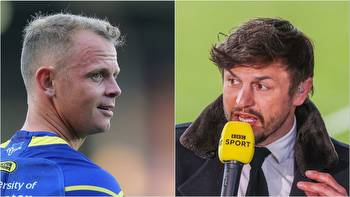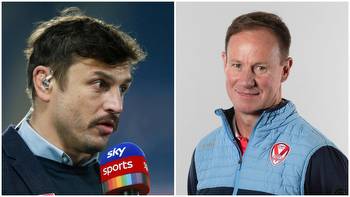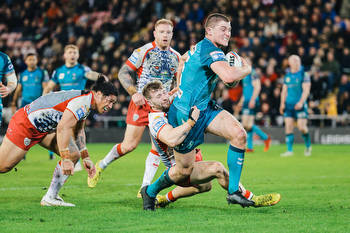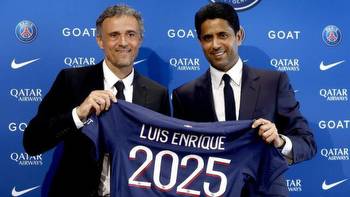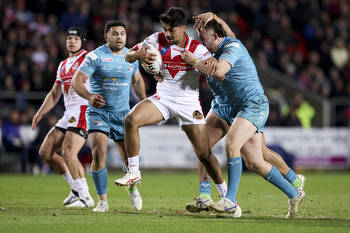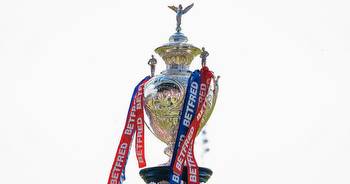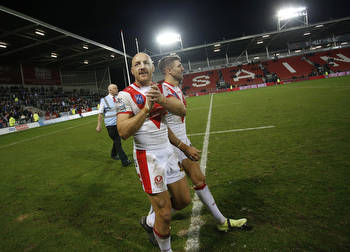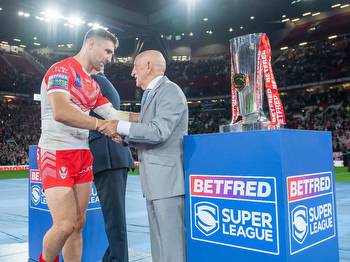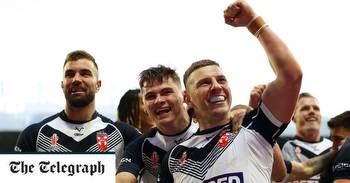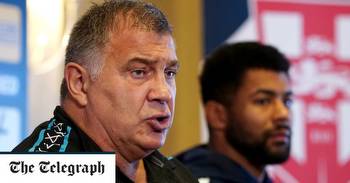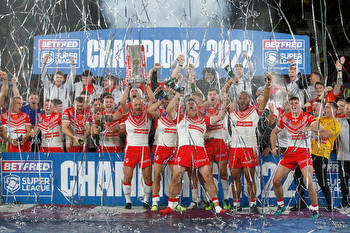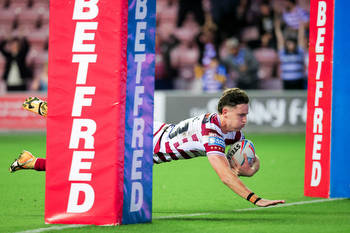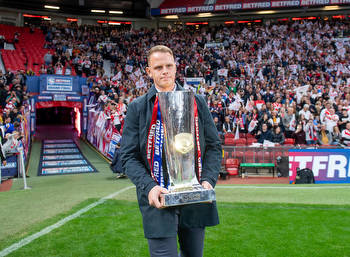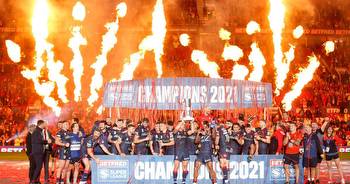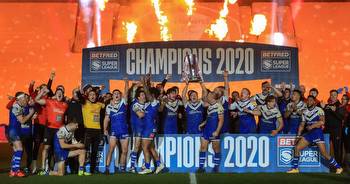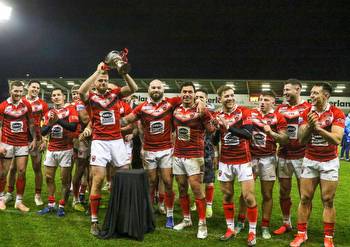TRIBUTE TO ERIC PRESCOTT
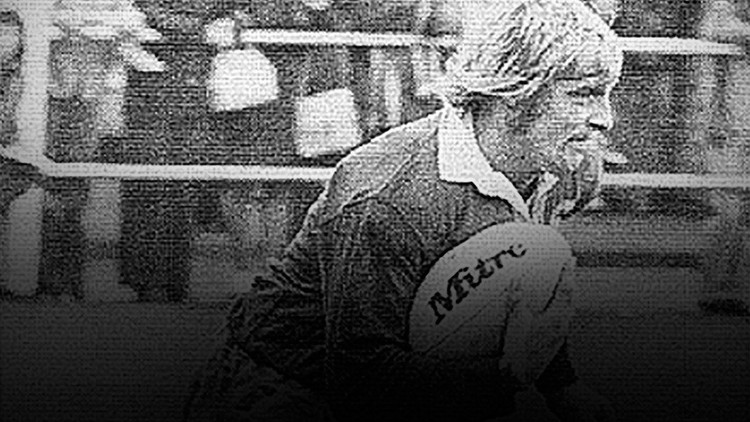
Everyone at Salford Red Devils has been greatly saddened at the news of the passing of the their marvellous, former loose forward, Eric Prescott.
A member of the great Salford team of the 1970s, the club is extremely proud that, of his incredible twenty year professional career, Eric chose to spend half of it with us. In special tribute to him, we reproduce an excerpt from an interview with him, first published last year, in which he describes his time playing for Salford and also shares his memories of his late son, Steve Prescott MBE:
Although not the only Salford player of the 1970s to have done so, both loose forward, Eric Prescott, and Salford RLFC, had such a high regard for each other, that he not only had one lengthy spell at the club, as their first choice loose forward, from 1972 to 1980, he also returned in 1983 for a further season.
A native of Widnes, it was however St Helens who first recognised his potential and talent, but competition for places there led to his transferring to Salford, where he very quickly made his mark.
“My first game with them all was against Rochdale, which we won, 46-18, at The Willows, all within the same week as my signing for them. When you sign for a new team, there is always a settling-in period as you get to know everything, and there is no way that you can possibly acquire all that in only two training sessions.
“Salford had a lot of moves which they would deploy at various times in the game, which made for a really good setup. They would call these moves out and everyone really needed to know their part in them.
“Defending teams, at that time, were kept only three yards back, which meant that they were able to get up onto the attacking team very quickly, and so having their practiced moves enabled attackers to fox the defence in some way. Nowadays, being up to ten metres apart moves are rather less effective as there is so much time for defences to read what is happening.
“Salford played really good football and the ball always went through a lot of hands in every match. We were always at our most dangerous in our own half of the field because when the other team were lying up on us, Kenny Gill or John Butler would put a kick through for Keith Fielding, and there was no-one going to catch him.
“Everyone had their own job within the team. I liked tackling. I liked the physicality involved, and also in aiming to get my technique just right on each occasion. There was also the benefit of limiting the effectiveness of the opposition’s attack.
“Tackling round the legs was probably the best way of tackling in those days, because you can’t go without your legs. Nowadays, it is regarded as more important to stop an offload, so tackling has drifted to the upper body. Elbows, back then, were far too discouraging to make that type of tackle worthwhile.
“I got my nose broken in my early days, in a match against Warrington. I was just getting up from a tackle to play the ball, when someone came in and smashed me across the face breaking my nose. You have to learn from those incidents.”
As with many of his teammates, Eric still regrets the fact that the team never managed to fulfil its promise of winning trophies, and having come from a club like St Helens, this sat a little more uneasily on his shoulders.
“We should have won a whole lot more than we did, considering the talent that we had in the team, and having left St Helens to come to Salford, I had to sit and watch their success from afar. They went to Wembley in 1976, and against all the odds won the Challenge Cup, and I remember thinking to myself that I’d missed out on that one.
“One of the reasons for my coming here was, with the team packed with all those internationals, I was expecting much the same from us, but we just couldn’t get through those early rounds of the Challenge Cup to get to the final. One season we were knocked out by St Helens themselves in what was, for us, a home match. That really hurt.”
Invariably, though, it was a trip into Yorkshire, to face Leeds or Castleford, around Rounds two and three, which put Salford out of the competition.
“Another problem was that, in those days, virtually all the teams were of a similar playing standard, so whilst we were one of the top sides, and, on our day, probably the most entertaining of them all, the remaining fifteen teams in the first division were not far behind. If we had an ‘off’ day, any one of them could have won. I remember Rochdale coming to the Willows and beating us, on one occasion. That sort of thing hardly ever happens nowadays.
Wembley may have had a hoodoo cast over it as far as the Salford team was concerned, but the calibre of the side was twice reflected in their winning the First Division Championship, in 1973/4 and 1975/6.
“That was certainly handsome compensation and probably worthy of greater notoriety than it received at the time, because the equality in standards throughout the league made it all the more challenging and difficult to achieve. Doing it twice, and so quickly after each other was a tremendous achievement.
“The first time was at the expense of St Helens, for once. It was a late Easter Weekend at the end of the season, and we needed to win at Wigan, on the Easter Monday, and then for Widnes to beat St Helens, later that evening, in order for us to lift the Trophy. We did all we could for ourselves in defeating Wigan, and then we all went over to Naughton Park, Widnes, which was so packed that we had to stand behind the posts to watch.
“It was quite absorbing because the game was so tight, with Saints in front at half time, but Widnes, with nothing but pride to play for, came back in the second half to win. Saints were such a good team at that time we couldn’t really have expected anything other than for them to win, but they came unstuck and we became Champions.
“We also won other trophies. We lifted the BBC2 Floodlit Cup, in 1972, with a win over Warrington, at Wilderspool, after drawing with them the week earlier at the Willows. That came very shortly after I had moved to Salford and was a real reward for having done so.
“The Lancashire Cup and the John Player Trophy were other competitions in which we also had successes, at least in reaching the final and semi-final. I think it is a loss to the game that these competitions have gone by the board, because they brought a bit of variety to the season, whilst as a player you were always wanting to win something.
“The Lancashire Cup win was one of my best memories. I had been injured just before, and came back to play in the final, against Swinton, at Warrington. We controlled the game well, and apart from the first twenty minutes of the second half, when they really came at us, we were on top throughout, and fully deserved the win.”
By the later years of the seventies, there was a fairly noticeable deterioration in the team, as players got older, some retired, and others moved elsewhere.
“The mid-seventies were extremely good, but standards did start to decline over the coming seasons. I still felt we had a good team then, but we just couldn’t get past those three or four clubs which had always been our downfall. I still had the hankering to play at Wembley, and, as time moved on, I began to realise this was not going to happen at Salford, so I started to look round for another club.
“Working, as I did, for Widnes Council, I sounded out the possibility of my moving there, because they were a club which was making significant progress, by then. The response from them was that they were quite willing to take me on board, if I were willing to play in the second row, which I was, and so I made the move to join them.”
Nothing is for ever, though, and a couple of seasons later he returned for one more spell, with prop, John Wood, transferring over to Widnes, in exchange.
“Salford approached me with a view to returning, and because I had been so very happy there, for so long, I agreed. Coming back again rekindled the memories of all those good times, and even though it was different this time around, I had absolutely no regrets of having done so.
“I liked the type of rugby Salford have always played, and alongside that, the people who were there were all so very friendly and approachable. I also still believed that we could have made up for the lack of trophies previously, by winning something this time around, but sadly this was not to be.”
Many years later, Eric was followed into the game by his son Steve Prescott, MBE. As father of someone who commands such admiration as Steve did, for all that he had done, firstly as a player, and then in both his fight against his own personal illness allied to his work in raising awareness of the condition, Eric, understandably, has very mixed feelings.
“I loved helping him along as a young, up and coming player, going along to matches with him and giving him encouragement and guidance along the way. Probably not all my advice was as helpful as it might have been, because he was a different type of player from me, with his being predominantly a back, whereas most of my career was spent in the forwards.
Tragically, in 2006, Steve was diagnosed with a rare form of cancer and given only a matter of months to live. Such devastating news was very hard for Eric to take.
“I just wished it could have been me because I’d had most of my life; Steve should still have had his in front of him. It just never works like that though.”
What Steve achieved in the remaining time he had left, which proved to be considerably more than the few months originally estimated, by means of the Steve Prescott Foundation, was absolutely phenomenal, and he was awarded the MBE for his services to rugby league and charity, in the 2010 New Year’s Honours List.
“It really was phenomenal what he achieved, particularly in aid of Manchester’s Christie’s Hospital. He loved doing it though, which, when you consider that his body by this time was well past anything like its physical peak, is incredible. I did a marathon in four hours and ten minutes, and his immediate response was that he was going to beat that, which he did, not at the first attempt, because he was very low with the cancer at the time, but at his second attempt.”
“It is so rewarding that the Foundation, in his name, is still going strong, under the direction of his wife, Jean, and also that since 2014, the top individual rugby league award has been known as the Steve Prescott Man of Steel. In addition, the bridge leading into the Totally Wicked Stadium is named after him, which is utterly brilliant because you can never forget him, every time you go over that bridge and into the ground.
“I can’t say it was a shock, when Steve passed away in 2013, because we had seen him going downhill for a while, but it still takes some coming to terms with, because we are not ‘programmed’ for anything like this to happen. It is just so very sad, but there are memories of him all around. Even when I do the National Lottery each week, I can still hear him deriding my chances of winning it. He just always wanted to be better than me.”
Eric, therefore, was the yardstick by which his remarkably splendid, younger, son, measured himself, and what greater form of flattering acknowledgement can there be, for any father!

